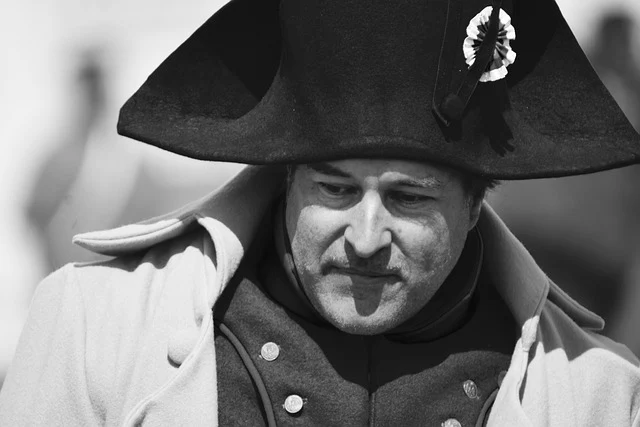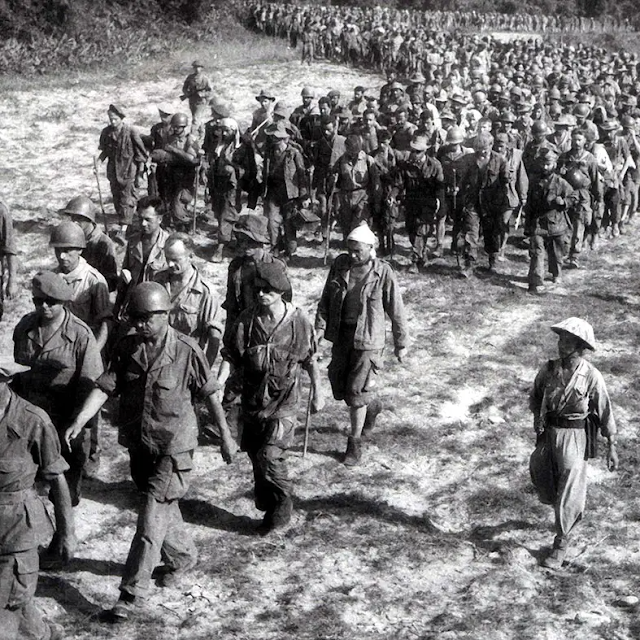Underground detonation..
A moment that sealed the fate of
an army that was "invincible"
On May 7, 1954 :
- the major defeat of the French in Vietnam in the Battle of Dien
- Bien Phu was completed with the mass surrender of their forces
- including their leaders, led by General Christian de Castries.
Vietnamese soldiers
raised their red flag over "Hill No.1"
- where the French military
- command was stationed
- and the decisive Battle of
Dien Bien Phu in the First Indochina War ended.
This famous battle took place between the forces of the Vietnam Liberation League
known as the "Viet Minh" for short, led by General Vo Nguyen Giap, and the French
forces led by General Christian de Castries.
This battle lasted from March 13 to May 7, 1954.
The Commander-in-Chief of
the French forces in Indochina, General Henri Navarre
believed that he had set an elaborate trap for the Vietnamese by establishing a
fortified base in a strategic location in the Dien Bien Phu Valley
near the border with Laos, but the trap turned into a cemetery.
The Vietnamese forces quickly surrounded
the French base with forces numbering 80,000 soldiers, reinforced by heavy
artillery, which the Vietnamese were able to transport across rugged terrain in an
innovative way, which consisted of dismantling it and transporting it in pieces.
The Vietnamese attack :
began on March 13 and their artillery intensely bombarded the French fortifications
and targeted the airstrip, disrupting French supplies from the air.
The Vietnamese
concentrated their military tactics on
- digging trenches and advancing in successive human waves.
- They succeeded in pushing the French back, and the area
- they controlled was reduced to less than 2 square kilometers.
The Vietnamese carried out their final attack on May 7, 1954 and were able to
destroy the French command center by underground bombing.
French General Christian
de Castries then shouted in a radio call
warning:
- The enemy is about to penetrate the central fort
- but the matter was over, and by four o’clock that
- evening the Vietnamese had taken control of the site.
The remaining :
French forces surrendered and most of them were captured, while a small number
of soldiers fled to Laos. The Battle of Dien Bien Phu ended with the killing of 2,293
French soldiers and the capture of 10,998 others.
After the French garrison surrendered :
the prisoners were taken on foot to special camps far to the north, while
the Vietnamese allowed the French to evacuate their seriously wounded
who were large in number.
The shock of :
defeat in front of what were described as "bands of savages" was great
and increased the next day with the launch of peace talks in Geneva, marking
the end of the French colonization of Indochina that had continued for a century.
The Battle of
- Dien Bien Phu was a significant sign of
- the failure of French plans that relied on air superiority
- fixed fortifications, and underestimation of the opponent's capabilities.
The defeat :
in this famous battle destroyed France's prestige in the soil and was the beginning
of the collapse of its colonial influence in other regions in addition to being a fatal
blow to its presence in Asia.
Le Figaro newspaper said :
at the time in describing that humiliating
defeat: "Silence covered the plain of Dien Bien Phu, and the remaining French
soldiers dispersed among the jungles," while Algerian leader Farhat Abbas
described the battle of "Dien Bien Phu" as a decisive battle of the colonial peoples.
General Vo Nguyen Giap revealed in a few words the secret of the Vietnamese
victory over a more trained and armed European army
by saying:
"The word fear does not exist in Vietnamese military thinking.".







